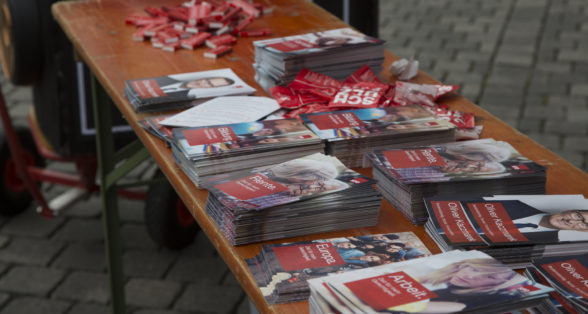So far 2017 has been tough ride for German social democrats. They lost three consecutive state elections earlier this year, including a painful defeat in their heartland of North Rhine-Westphalia in March. Then the national SPD leader, Martin Schulz, steadily lost public support over the summer, culminating in the party’s lowest postwar vote share at 20.5% in September’s federal election.
So Schulz took a fragile party into the Lower Saxony state election this month – a vote that was seen as a test for both the social democrats and the new coalition partners of the centre-right CDU/CSU, the liberal FDP and the Greens in Berlin.
On election night, the SPD celebrated a somewhat unexpected comeback, finishing in pole position with 36.9% of the vote. For this traditional centre-left stronghold, this was the first social democratic victory since Gerhard Schröder’s win 19 years ago. The result can largely be attributed to the campaign of a competent and well respected SPD candidate, Stephan Weil, whose message resonated much better than that of a largely unknown centre-right frontrunner. On top of this, the coalition talks in Berlin seem to have helped the SPD refresh its image as a force for political change.
Weil, the minister president in waiting, is now left with task of forming a coalition in Lower Saxony, possibly a minority government with the Greens, and he can expect to play a more prominent role on the national stage as well.
Following September’s disastrous federal result, the SPD decided to take the role of the official opposition in the Bundestag, increasing the party’s ability to be flexible in its position on a range of core issues, including Europe, social policy and economic reform. As the strongest opposition voice, the SPD will be able to curb the parliamentary influence of the AfD and, more pragmatically, the party will avoid suffering another term as a junior partner under Merkel.
Despite the result in Lower Saxony being a great success for the SPD in a key German state, it was unwelcomed – at least behind closed doors – by those federal leftwing forces that want to see the party make a fresh start. Bearing in mind the historic defeat in September, some fear the party is on the same path of decline as its counterparts across Europe, such as the Socialist party in France or Dutch Labour, and only a radical shift can stop this downward trajectory.
In the wake of the federal vote, Schulz indicated that the balance of power in the party could take a leftward turn. To remain leader, he reached a Faustian deal with Andrea Nahles, who represents the left wing of the party, with a strong network in the Bundestag reaching back to her time as general secretary from 2009-2013. She was promoted to chair of the SPD parliamentary group – a powerful position in the German political system. In return, Schulz could continue as leader, at least until December’s party conference.
Nahles’ appointment could have kickstarted a regeneration process of the party bringing in young, fresh and – crucially to many – more female talent. But for now it looks as if there is only more of the same to come. The result in Lower Saxony appears to have halted hopes for radical internal reform and paused any significant movement to the left.
A week after the election, Lars Klingbeil was nominated by Schulz as the new general secretary, and will most likely take over from Hubertus Heil at the party conference in December given he currently faces no contender. Like his predecessor, Klingbeil is a man from Lower Saxony, belonging to the conservative wing of the party. While he is not a fresh face, his political forte is his grasp of the impact of technology on society and the economy, leading much of the political thinking in Germany surrounding digital issues. This could send a strong positive signal for those who thought the SPD lacked innovative policy ideas and a coherent narrative on economic reform – and could yet ensure this difficult year is used as an impetus for regeneration.

 Germany
Germany 
